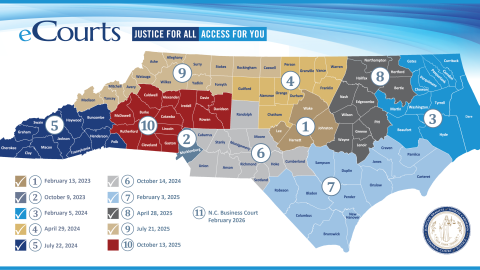North Carolina Implements eCourts Conversion in All 100 Counties
Article contents

All 100 North Carolina counties will have online access to court records and services as of Monday, October 13, 2025.
The final group of counties to implement the eCourts conversion is comprised of Alexander, Burke, Caldwell, Catawba, Cleveland, Davidson, Davie, Gaston, Iredell, Lincoln, McDowell, Rowan, and Rutherford counties.
“Saving North Carolinians countless trips to the courthouse and expanding access to court records through convenient online services was the foremost priority, and proud legacy, of the eCourts conversion,” said NCAOC Director Ryan S. Boyce.
“Online court records are a vital resource for millions of people in our state seeking access to justice. The Judicial Branch is grateful for the hard work of judicial officials, courthouse staff, and partners across North Carolina to implement this historic transformation.”
For over two centuries, court users were required to file documents in paper and could only search case records in courthouses during business hours. The eCourts conversion enables the public to file and access court records online at any time. Track 10 connects every North Carolina county onto one cloud-hosted system of web applications for every case type.
The system is also used by law enforcement statewide, supporting more than 47,000 combined registered users of the eWarrants and Enforcement Mobile applications. It supports automated criminal data sharing with public safety infrastructure including the Criminal Justice Law Enforcement Automated Data Services (CJLEADS) application. State law enforcement agencies, sheriffs, and police, use the system daily to issue citations, serve orders for arrest, and execute warrants.
The system is also used for information sharing, search, filing, and other core operations, with state partners including the Department of Information Technology and Government Data Analytics Center, the Department of Motor Vehicles, the Department of Public Safety, the State Bureau of Investigation, the State Bar, the Department of Health and Human Services, local county services, and healthcare providers.
More than 5 million digital searches are conducted monthly through the eCourts Portal, saving citizens trips and phone calls to the courthouse for case information and documents.
The eCourts conversion also launched Guide & File, a user-assisted interview tool that helps the public complete and submit common legal filings. North Carolinians have created more than 120,000 Guide & File digital documents since launch.
The eCourts conversion delivered a range of transformative improvements that enhance efficiency and transparency in the justice system:
- 24/7 online access to court records, case events, and eFiling
- Reduced travel, in-person appointments, and courthouse congestion
- Standardized statewide business processes and electronic workflows
- Enhanced cybersecurity, data recovery, and digital storage capacity
- Robust business continuity for times of natural disaster and pandemic
- Streamlined judicial access to cases, calendars, and dockets from anywhere
- Real-time public safety integration with law enforcement systems
- Millions of paper documents and forms replaced with digital versions
- Enhanced wireless networks, bandwidth, and local equipment
A large network of IT and software teams from NCAOC supports the eCourts transition through training, on-site assistance, remote monitoring, and help desk response.
Preparations and walkthroughs for each track of the eCourts transition begin months in advance to train court officials, attorneys, and the public on new technologies and processes, install improved network infrastructure in courthouses, program custom integrations, and migrate case event data and court records from mainframe indexes and paper to a dynamic cloud-hosted platform.
Legal professionals and justice partners are encouraged to register for live and on-demand training sessions, and to access educational resources—including step-by-step guides, walkthrough videos, and frequently asked questions—available at NCcourts.gov/eCourts.